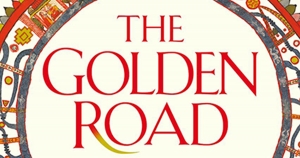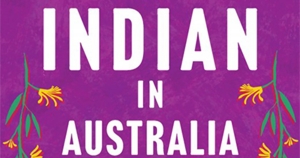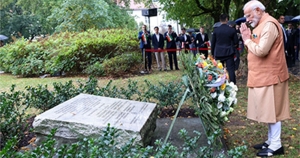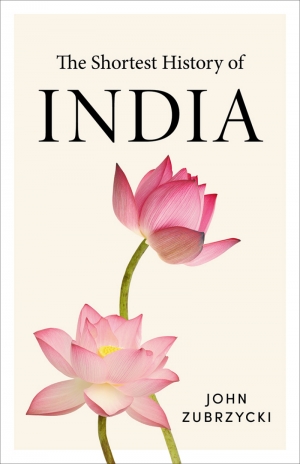India
Marika Vicziany reviews ‘The Golden Road: How ancient India transformed the world’ by William Dalrymple
William Dalrymple’s tour de force avoids all the pit-falls of superpower competition, identity politics, and over-simplification, but nonetheless places Indian cultural and economic achievements at the centre of the changing worlds of the West and Asia from c.250 bce to 1200 ce. The Golden Road: How Ancient India transformed the world explains how and why Indian influence in China reached a high-water mark ‘never to be reached again’ during the reign of Empress Wu Zetian (the Fifth Concubine), who died at the age of eighty-one in 705 ce, having ruled China for some fifty years.
... (read more)Claudia Hyles reviews ‘Growing up Indian in Australia’ edited by Aarti Betigeri
Don’t judge a book by its cover? There is no problem with this book. The cover and artist’s note, declaring inspiration from such diverse art forms as traditional Indian miniature painting, Indian matchbox design, and a ‘harmonious blend of Indian and Australian flora’, encapsulate the intertwining narratives and cultural crossovers of the stories within.
... (read more)The twilight of Narendra Modi: India’s leader’s invincibility is fraying
The monsoon has now settled the dust stirred up during an eventful and blisteringly hot early summer in India. From April to June, in seven stages of voting and in temperatures that in some parts reached the high forties Celsius, almost 650 million people cast their votes in the largest election ever organised. The polls and the pundits predicted another big victory for Narendra Modi and the Bharatiya Janata Party (BJP). Yet when the verdict came, it surprised most observers. The BJP, supported by its coalition partners, was returned to office with far fewer seats than expected, and with Modi’s political authority much diminished.
... (read more)John Zubrzycki reviews 'Australia’s Pivot to India' by Andrew Charlton
In April 1990, Australia’s high commissioner to New Delhi, Graham Feakes, was in the final year of a six-year posting. Still regarded as one of Australia’s finest diplomats, he had worked tirelessly to invigorate a relationship that had been allowed to drift aimlessly for decades. Under his watch, in 1986 Rajiv Gandhi made the first visit by an Indian prime minister to Australia in almost two decades. Bob Hawke reciprocated shortly afterwards. Ministerial commissions and senior level officials’ groups were established. Aid was set to increase.
... (read more)This year marks seventy-five years of Indian independence from Britain. The anniversary coincides with India’s Presidency of the G20 summit, which will take place in New Delhi this September. This week on the ABR Podcast, we hear from John Zubrzycki, who argues that Indian Prime Minister Narendra Modi is using the G20 platform to articulate a new foreign policy stance. John Zubrzycki has worked in India as a diplomat and foreign correspondent and is the author of The Shortest History of India. Listen to John Zubrzycki with ‘Politics by other means’.
... (read more)It is 1856 in a village near Lucknow, the capital of the northern Indian kingdom of Awadh. Two nawabs, Mir and Mirza, are engrossed in a game of chess, oblivious to the calamity unfolding around them. Satyajit Ray’s 1977 screen adaptation of Munshi Premchand’s short story ‘The Chess Players’ captures the decadence and idleness of Awadh, whose indulgent nobility preferred reciting Urdu poetry, listening to ghazals, and enjoying the sensuous pleasures of the zenana to paying attention to the well-being of their subjects. As Mir and Mirza continue the chess game, their state is annexed by the British on the pretext of maladministration – without a shot being fired.
... (read more)Quite a few years ago, when the future was far more important than the days gone by and the past hadn’t acquired that elusively seductive voice to beckon me with the urgency that it does now, I tended to be rather flippant about the notions of ‘home’ and ‘homeland’. ‘Home’ simply meant where I was at any given time. To an extent such a shallow definition can be attributed to my early experiences of travel and the consequences of the constantly changing landscape which confronted a young backpacker who didn’t feel the necessity of a cultural anchor. I simply moved from one country to another, with the restless compulsion of the Wandering Jew, to satiate a curiosity sparked off by a trip to the exotic wilderness of the Khyber Pass when I was a child.
... (read more)John Zubrzycki on illiberalism in Modi’s India | The ABR Podcast #110
A year before he ascended to the prime ministership of India in 1947, Jawaharlal Nehru proclaimed that his nation was ‘a cultural unity amidst diversity, a bundle of contradictions held together by strong but invisible threads’. Yet, in the seventy-five years since India’s independence, secularist tolerance of religious and cultural difference has been eroded by a rising tide of Hindu majoritarianism. In this week’s episode of The ABR Podcast, John Zubrzycki reads his commentary on India’s transformation under Narendra Modi’s leadership ...
... (read more)It takes genuine courage to attempt a synoptic history of India and considerable skill to abridge the story of more than five thousand years into a book of fewer than three hundred pages. For a start, the evidence we have for what occurred during the first forty centuries is scarce and uneven. Archaeologists have unearthed planned towns, figurines, seals, pots, and tools that attest to the existence of a sprawling and successful society flourishing in the Indus Valley from around 3300 BCE until 1300 BCE. But as John Zubrzycki explains in this clever book, we know little if anything about how this Harappan civilisation was ruled or organised, partly because its script has not been deciphered and partly because no buildings akin to palaces or temples have yet been found.
... (read more)The power paradox: Illiberalism and Hindu majoritarianism in Modi’s India
On 15 August 2022, it will be seventy-five years since Jawaharlal Nehru declared that India’s ‘tryst with destiny’ had finally been ‘redeemed’. The rapturous crowds that gathered outside the Constituent Assembly in New Delhi on that sultry summer night cheered as loudspeakers relayed the words: ‘At the stroke of the midnight hour, when the world sleeps, India will awake to life and freedom.’
... (read more)








